The Intel Optane Memory M10 (64GB) Review: Optane Caching Refreshed
by Billy Tallis on May 15, 2018 10:45 AM EST- Posted in
- SSDs
- Storage
- Intel
- PCIe SSD
- SSD Caching
- M.2
- NVMe
- Optane
- Optane Memory
Sequential Read Performance
Our first test of sequential read performance uses short bursts of 128MB, issued as 128kB operations with no queuing. The test averages performance across eight bursts for a total of 1GB of data transferred from a drive containing 16GB of data. Between each burst the drive is given enough idle time to keep the overall duty cycle at 20%.
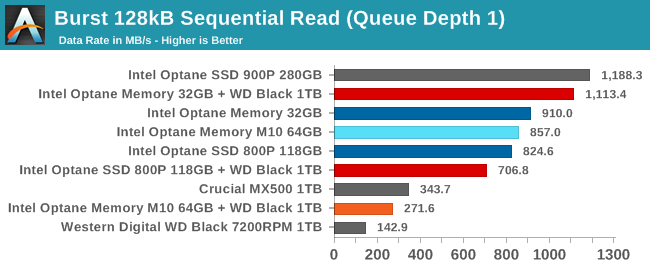
The burst sequential read results are bizarre, with the 32GB caching configuration coming in second only to the Optane SSD 900P while the large Optane M.2 modules perform much worse as cache devices than as standalone drives. The caching performance from the 64GB Optane Memory M10 is especially disappointing, with less than a third of the performance that the drive delivers as a standalone device. Some SSD caching software attempts to have sequential I/O bypass the cache to leave the SSD ready handle random I/O, but this test is not a situation where such a strategy would make sense. Without more documentation from Intel about their proprietary caching algorithms and with no way to query the Optane Memory drivers about the cache status, it's hard to figure out what's going on here. Aside from the one particularly bad result from the M10 as a cache, all of the Optane configurations do at least score far above the SATA SSD.
Our test of sustained sequential reads uses queue depths from 1 to 32, with the performance and power scores computed as the average of QD1, QD2 and QD4. Each queue depth is tested for up to one minute or 32GB transferred, from a drive containing 64GB of data.
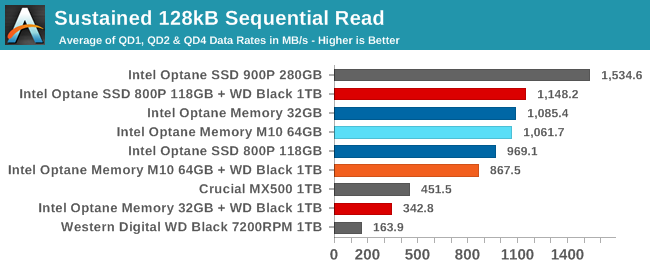
The sustained sequential read test results make more sense. The 32GB cache configuration isn't anywhere near large enough for this test's 64GB dataset, but the larger Optane M.2 modules offer good performance as standalone drives or as cache devices. The 64GB Optane Memory M10 scores worse as a cache drive, which is to be expected since the test's dataset doesn't quite fit in the cache.
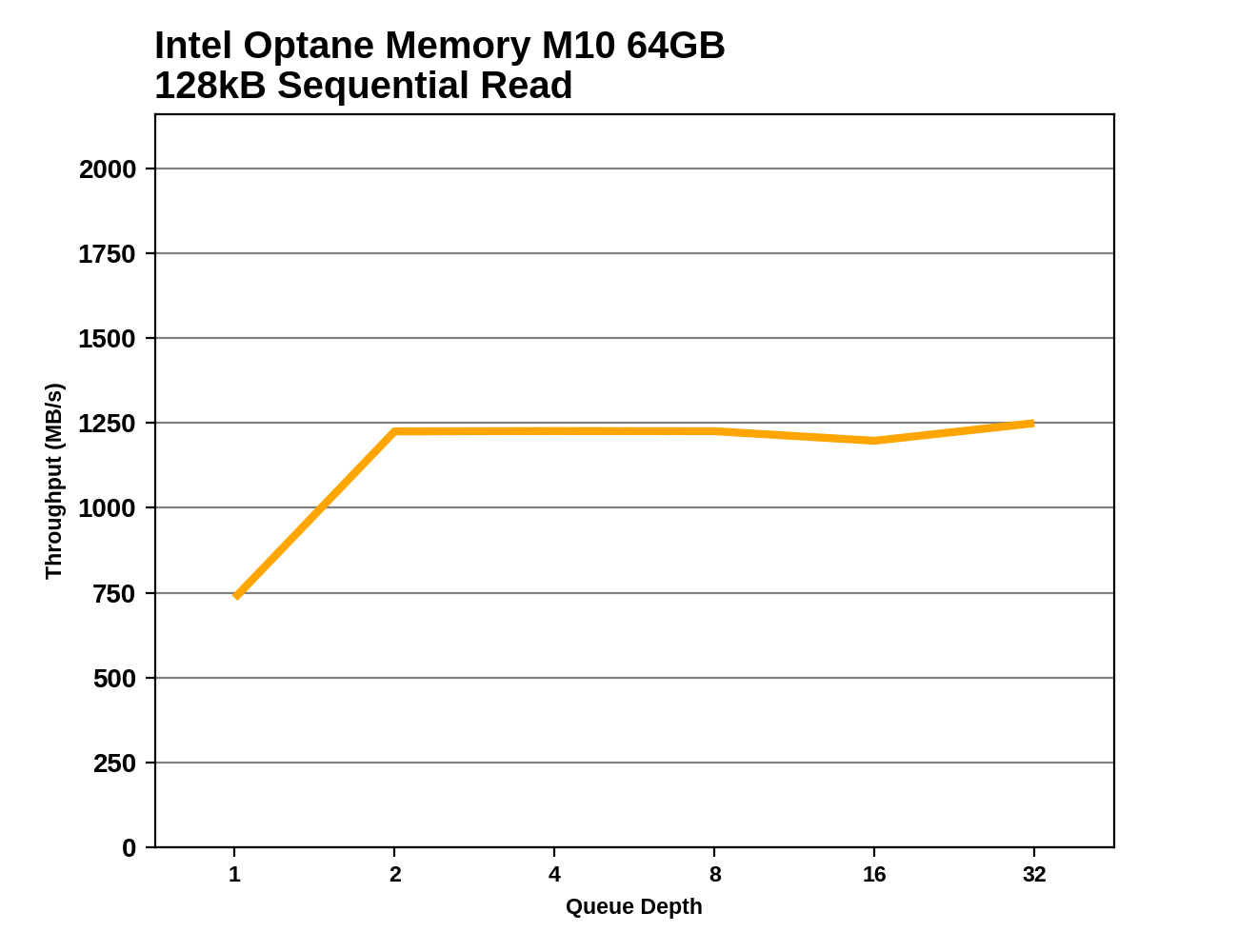 |
|||||||||
Using an 118GB Optane M.2 module as a cache seems to help with sequential reads at QD1, likely due to some prefetching in the caching software. The 64GB cache handles the sustained sequential read workload better than either of the sustained random I/O tests, but it is still slower than the SSD alone at low queue depths. Performance from the 32GB cache is inconsistent but usually still substantially better than the hard drive alone.
Sequential Write Performance
Our test of sequential write burst performance is structured identically to the sequential read burst performance test save for the direction of the data transfer. Each burst writes 128MB as 128kB operations issued at QD1, for a total of 1GB of data written to a drive containing 16GB of data.
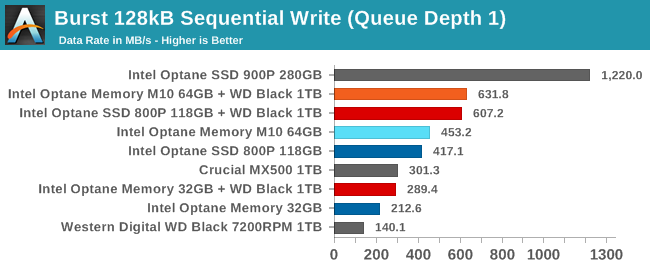
As with the random write tests, the cache configurations show higher burst sequential write performance than testing the Optane M.2 modules as standalone SSDs. This points to driver improvements that may include mild cheating through the use of a RAM cache, but the performance gap is small enough that there doesn't appear to be much if any data put at risk. The 64GB and 118GB caches have similar performance with the 64GB slightly ahead, but the 32GB cache barely keep up with a SATA drive.
Our test of sustained sequential writes is structured identically to our sustained sequential read test, save for the direction of the data transfers. Queue depths range from 1 to 32 and each queue depth is tested for up to one minute or 32GB, followed by up to one minute of idle time for the drive to cool off and perform garbage collection. The test is confined to a 64GB span of the drive.
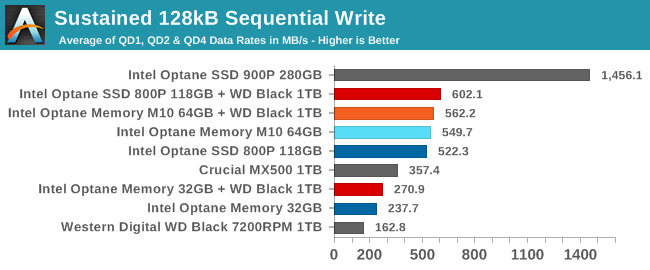
The rankings on the sustained sequential write test are quite similar, but this time the 118GB Optane SSD 800P has the lead over the 64GB Optane Memory M10. The performance advantage of the caching configurations over the standalone drive performance is smaller than for the burst sequential write test, because this test writes far more data than could be cached in RAM.
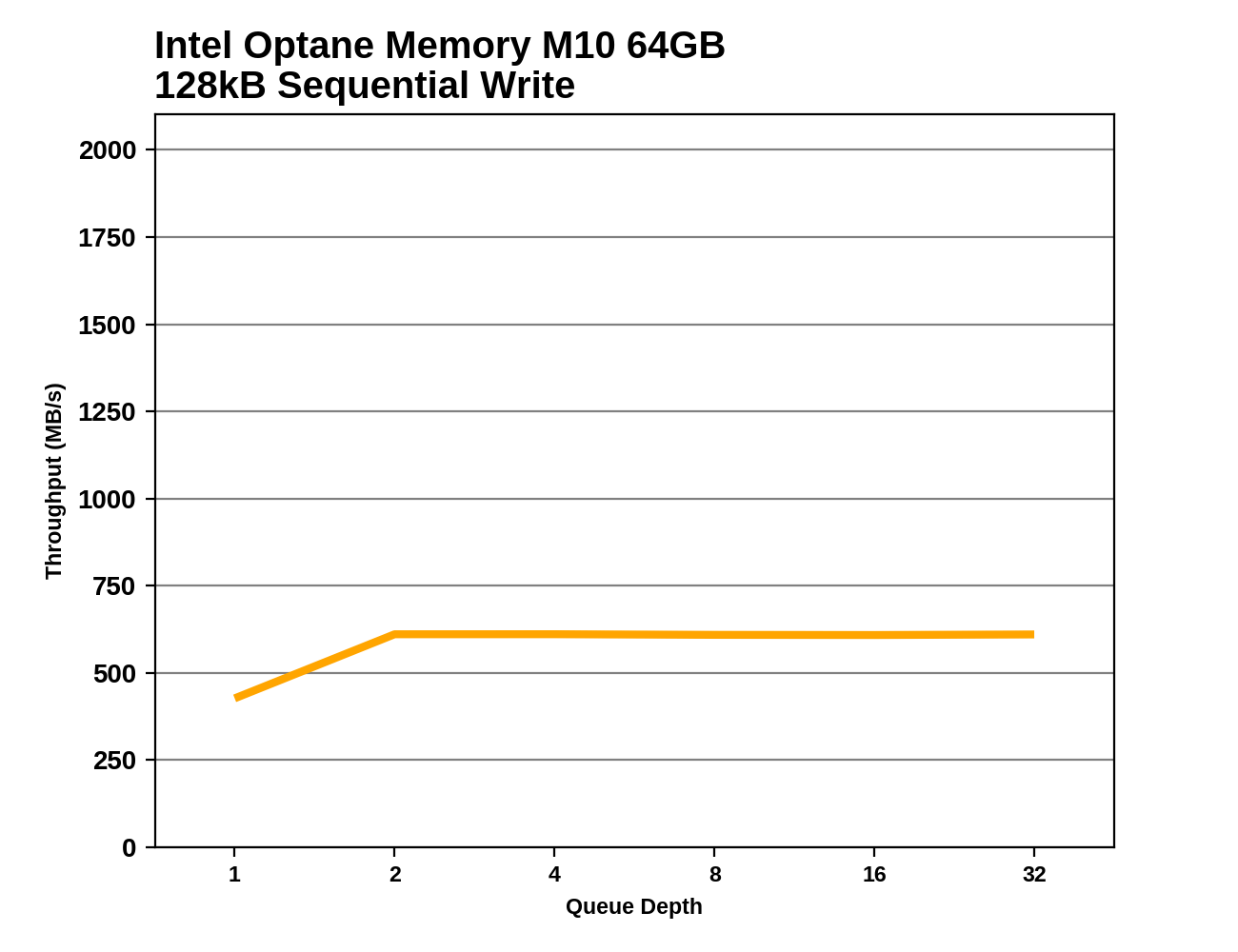 |
|||||||||
Aside from some differences at QD1, the Optane M.2 modules offer basically the same performance when used as caches or as standalone drives. Since this test writes no more than 32GB at a time without a break and all of the caches tested are that size or larger, the caching software can always stream all of the writes to just the Optane module without having to stop and flush dirty data to the slower hard drive. If this test were lengthened to write more than 32GB at a time or if it were run on the 16GB Optane Memory, performance would plummet partway through each phase of the test.










96 Comments
View All Comments
TrackSmart - Tuesday, May 15, 2018 - link
People seem to be talking around each other in these threads, without actually reading the substance of each person's reply.Dr. Swag didn't mention ONLY using a 500GB SSD. Just the opposite. He/she was suggesting that you could use a 500GB SSD for both a boot drive AND a 64GB cache drive. So you end up with ~440GB of normal SSD space (enough for most programs) AND a ~60GB cache drive to speed up your HDD accesses. All for the same price as adding a 64GB optane drive.
Addressing Dr. Swag's actual comment: I partially agree. One downside to the arrangement you suggested is that most affordable SSDs have lower write endurance than cache drives. They are also likely to be slower than an optane drive (but still fast compared to HDDs). And if your SSD boot/cache all-in-one drive dies, you might lose data on both the SSD and the HDD.
Regarding WithoutWeakness: Your comment makes sense if you are accessing the same subset of data over-and-over again. But if you are accessing a block of data ONCE to run an analysis and then moving onto a new block of data, then you will experience HDD speeds. Same goes for the first access to the data in cases where you will be using it multiple times. Slow the first time, faster in future times. So the downsides of a small cache will remain in a number of scenarios.
I personally think that Intel missed the boat with Optane. These solutions would have been a lot more convincing when SSD storage was a lot more expensive (i.e. 5+ years ago) and before other caching options existed for making use of 'normal' SSDs.
ಬುಲ್ವಿಂಕಲ್ ಜೆ ಮೂಸ್ - Tuesday, May 15, 2018 - link
Power loss protection ?From what I know so far, the MX500 (500GB) cache contains unique data that has not yet been written to normal nand and Crucial does not recommend using an SLC cache unless you have battery backup protection
An Optane cache drive is a "copy" of data already on the hard drive (or SSD) and I don't see a problem with power loss resulting in data loss once you clear the cache
SkipPpe - Friday, May 18, 2018 - link
Something like an Intel 3510 would be a better drive to use for this.ಬುಲ್ವಿಂಕಲ್ ಜೆ ಮೂಸ್ - Tuesday, May 15, 2018 - link
DOH......Nevermind!
sharath.naik - Tuesday, May 15, 2018 - link
I was wondering if the lifespan of these are no better than SSD. wont this burn out much faster than the drives lifespan if used as a cache for it?MajGenRelativity - Tuesday, May 15, 2018 - link
Optane drives are more durable than the average SSDCheapSushi - Wednesday, May 16, 2018 - link
Even more so than MLC NAND, which seems to be getting harder and harder to find (aside from Samsung's PRO line).Drumsticks - Tuesday, May 15, 2018 - link
Is anybody else interested in the performance of the 800p as a cache drive? The difference between an Optane SSD 800p and a 1TB HDD versus a 1TB SATA drive nowadays is less than $15, so it's pretty comparable for effectively the same capacity of storage. On the other hand, in the 25 or so graphs presented in this review, the 118GB caching solution outperforms a SATA drive, sometimes handily, in 24 of them. The 25th is power consumption, and one of them has a single loss in run 1 of the latency measurement for the heavy test.Hell, sometimes that solution outperforms the 900p. Why would you pick a comparably priced 1TB SATA SSD over something like that? If you need less storage, a 500GB will perform even worse than a 1TB, and a 250GB would be even worse still. Going down in capacity on the Optane drive would still probably keep you in the range of the SATA drive, while leaving you with double or quadruple the capacity.
Giroro - Tuesday, May 15, 2018 - link
"58GB 800P is functionally identical to the 64GB M10 and both have the exact same usable capacity of 58,977,157,120 bytes."Hold on, either something is wrong or that is straight-up false advertisement, a new low that is far beyond how storage manufacturers usually inflate their capacity specs. Don't just breeze past the part where Intel may be illegally marketing this thing. As far as I know Optane doesn't use over-provisioning, and it definitely isn't the normal GiB/GB conversion issue or the typical "formatting" excuse that doesn't actually apply to solid state media, so what gives?
It has to be a mistake, right?
The_Assimilator - Wednesday, May 16, 2018 - link
> it definitely isn't the normal GiB/GB conversion issueActually, it is.